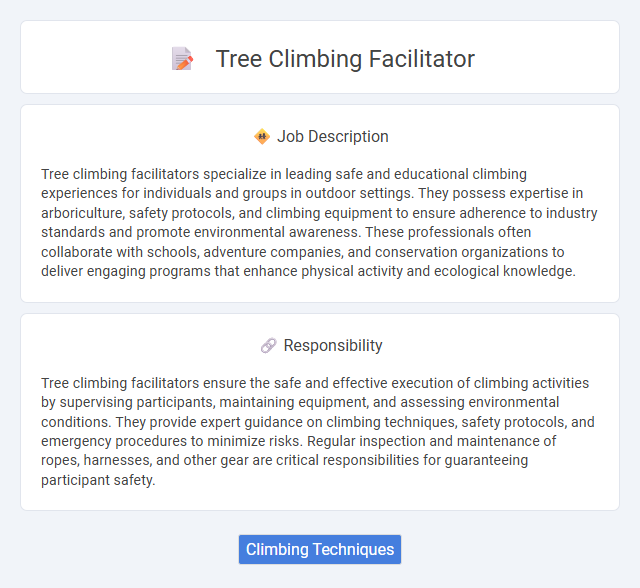
Tree climbing facilitators specialize in leading safe and educational climbing experiences for individuals and groups in outdoor settings. They possess expertise in arboriculture, safety protocols, and climbing equipment to ensure adherence to industry standards and promote environmental awareness. These professionals often collaborate with schools, adventure companies, and conservation organizations to deliver engaging programs that enhance physical activity and ecological knowledge.
Individuals with good physical fitness and a strong sense of balance are likely to be suitable for a tree climbing facilitator role, as the job demands agility and endurance. Those with a fear of heights or limited upper body strength may find the position challenging or unsuitable. Experience in outdoor activities or climbing can improve the probability of success and satisfaction in this career.
Qualification
A Tree Climbing Facilitator must hold certifications in arboriculture and advanced tree climbing techniques, ensuring expertise in safety protocols and equipment handling. Experience in environmental education or outdoor leadership is essential to effectively guide and instruct participants of varying skill levels. Proficiency in first aid and risk assessment is required to maintain participant safety during climbing activities in diverse terrains.
Responsibility
Tree climbing facilitators ensure the safe and effective execution of climbing activities by supervising participants, maintaining equipment, and assessing environmental conditions. They provide expert guidance on climbing techniques, safety protocols, and emergency procedures to minimize risks. Regular inspection and maintenance of ropes, harnesses, and other gear are critical responsibilities for guaranteeing participant safety.
Benefit
Tree climbing facilitator roles likely offer significant physical and mental health benefits by promoting outdoor activity and connection with nature. Participants may experience improved strength, coordination, and stress relief due to the immersive, hands-on climbing experiences guided by these professionals. The role probably also enhances leadership and communication skills as facilitators support varying skill levels in group settings.
Challenge
Tree climbing facilitator roles likely present significant physical and mental challenges, requiring strong problem-solving skills to navigate complex arboreal environments safely. Candidates may face unpredictable weather conditions and varying tree structures, testing their adaptability and resilience. The role probably demands a high level of focus and endurance to guide participants effectively while ensuring safety protocols are strictly followed.
Career Advancement
Tree climbing facilitator roles offer significant opportunities for career advancement through specialized training in arboriculture, safety protocols, and rescue techniques. Professionals can progress to senior climbing instructor positions, arborist certifications, or leadership roles in outdoor adventure companies. Mastery in tree climbing skills combined with expertise in risk management enhances prospects for higher-paying and supervisory positions within the industry.
Key Terms
Climbing Techniques
Tree climbing facilitators specialize in teaching advanced climbing techniques such as single rope technique (SRT) and double rope technique (DRT) to ensure safe and efficient ascents. They provide hands-on training in harness use, knot tying, and proper belaying methods tailored to various tree species and environmental conditions. Mastery of these techniques is critical for preventing accidents and enhancing the climbing experience in both recreational and professional arboriculture settings.
 kuljobs.com
kuljobs.com